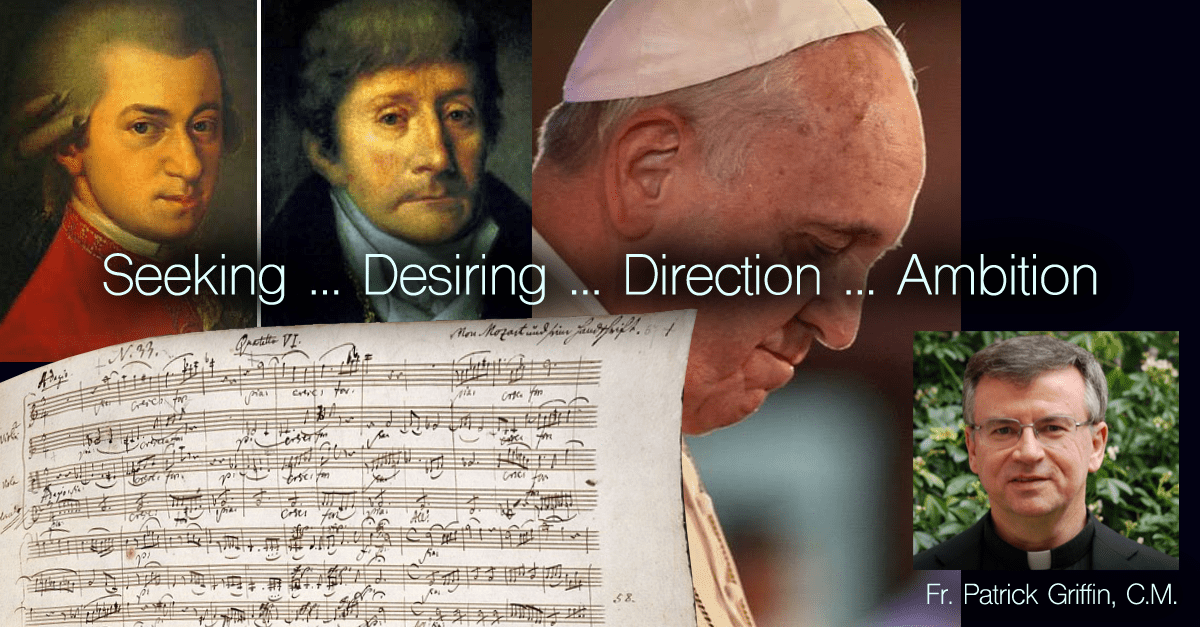A Heart’s Desire Griffin

Fr. Pat Griffin continues his series “Considering Consecrated Life” with a reflection on
“A Heart’s Desire”
The film “Amadeus” offers a compelling and colorful telling of the life of Mozart. At its end, Salieri, who had been jealous of Mozart, characterizes himself as “the Patron Saint of Mediocrity.” Comparing his own musical creativity to Mozart’s genius left him no other option. For the viewer, amusement and sadness accompany this admission. We can sympathize with the desire for greatness. The problem was that Salieri longed to be the great Mozart rather than a great Salieri. His goal of striving to reach the heights of his craft was right, but his aim was off.
Pope Francis has something wonderful to say about ambition and how it should give direction and meaning to a consecrated life.
“Look into the depths of your heart, look into your own inner depths and ask yourself: do you have a heart that desires something great, or a heart that has been lulled to sleep by things? Has your heart preserved the restlessness of seeking or have you let it be suffocated by things that end by hardening it?” (Francis quoted in Rejoice! Letter to Consecrated Persons, para 5, 2Feb14)
Another insightful call to an examination of conscience! (This kind of summons qualifies as one of Francis’ gifts.)
Clearly, the desire to excel is not the issue. We might fear the problem of pride or the sin of selfishness when we place too much emphasis in succeeding at a given task, but that should not hinder our striving for what truly defines greatness. We should seek to excel in charity; we should model generosity; people should rely on our ready forgiveness. Should a yearning to match Vincent de Paul or Louise de Marillac or Frederik Ozanam in living the Christian life be considered a fault or a goal?
Too often, we may allow ourselves to be satisfied with much less than achieving the greatness of these exemplary individuals. We become satisfied with being better (in our opinion) than the other person despite our different gifts and resources. As long as we rise above the middle, we may think that we are virtuous enough. Sometimes, just talking about greater holiness might seem enough! We can be “lulled to sleep” by things and our own voice.
Francis summons us to “restlessness”—an idea which finds expression in his writings in different ways. He aligns his thinking with the much-quoted statement which occurs in the opening lines of Augustine’s Confessions: “You have made us for yourself, and our heart is restless until it rests in you” (Confessions, 1, 1, 1). One might also point to Psalm 62 (vv. 6-7):
My soul, be at rest in God alone,
from whom comes my hope.
God alone is my rock and my salvation,
my fortress; I shall not fall.
The calling is not to be fidgety and nervous, but focused on a greater goal which continually draws us forward. Our Christian summons invites us to set goals for ourselves in living the Gospel life which challenge and inspire. Robert Browning expresses it in this way:
“Ah, but a man’s reach should exceed his grasp,
Or what’s a heaven for?” (Robert Browning, Andrea del Sarto)
A heart’s desire which sets its sights on being a better basketball player than Michael Jordan or a better scientist than Isaac Newton dooms one to a sense of inadequacy and discontent. Yet always seeking the “low-hanging fruit” which do not challenge a person’s intelligence or physical ability can lead to disappointment and a sense of failure. We never become our best selves. A lesson from Martin Buber is instructive:
A rabbi named Zusya died and went to stand before the judgment seat of God. As he waited for God to appear, he grew nervous thinking about his life and how little he had done. He began to imagine that God was going to ask him, “Why weren’t you Moses or why weren’t you Solomon or why weren’t you David?” But when God appeared, the rabbi was surprised. God simply asked, “Why weren’t you Zusya?” (Martin Buber, Tales of the Hasidim)
As Vincentians, many wonderful models of Christian living bless our story. They remind us of how our heart’s desire should always emphasize our service of the most marginalized. We accomplish this goal not by being better than anyone else, but by taking advantage of the gifts given to us in the most practical way that we can.







0 Comments